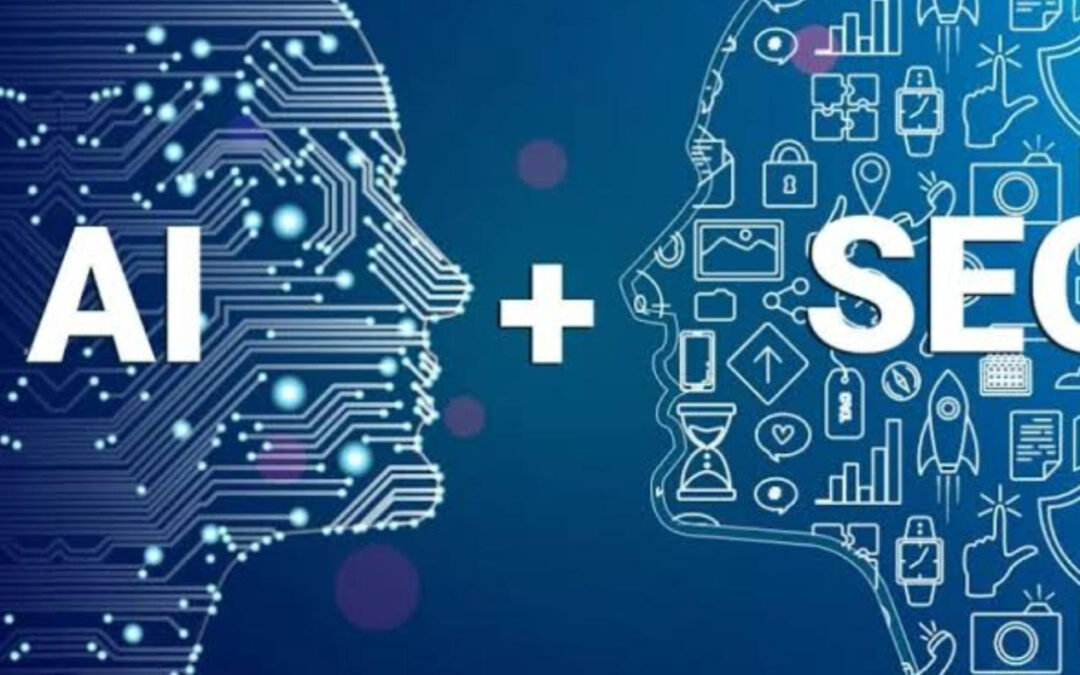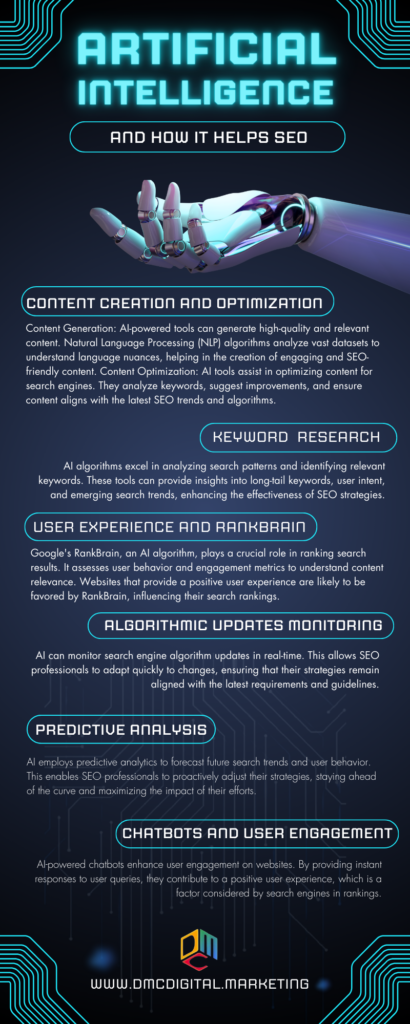In terms of Search Engine Optimization (SEO), Artificial Intelligence (AI) emerges as a powerful force, reshaping strategies and outcomes. By using A.I in SEO methodologies, businesses unlock a realm of efficiency, precision, and agility, crucial for navigating the intricacies of the digital sphere. This integration marks a pivotal shift, empowering enterprises to not only keep pace but also excel amidst the perpetual evolution of online dynamics.
Here’s how A.I can help in SEO:
- Content Creation and optimization.
Artificial Intelligence (AI) offers a multifaceted approach to content optimization and creation within the world of Search Engine Optimization (SEO). Through advanced algorithms and natural language processing capabilities, AI can analyze vast amounts of data to identify trends, keywords, and user intent, thereby optimizing content for maximum visibility and relevance. Additionally, AI-powered tools can generate content autonomously, leveraging insights gleaned from data analysis to craft engaging and tailored pieces that resonate with target audiences. This fusion of AI technology with SEO practices not only streamlines content creation processes but also enhances the overall effectiveness of digital marketing strategies by delivering content that is both optimized for search engines and compelling for human audiences. - Keyword Research
In the context of SEO, Artificial Intelligence (AI) revolutionizes keyword research by leveraging its computational power and data analysis capabilities to unearth valuable insights. Through AI-driven algorithms, vast amounts of data from search engines, social media platforms, and other online sources can be analyzed swiftly and comprehensively. AI can identify emerging trends, user preferences, and patterns in search queries, allowing for the discovery of high-value keywords that align with both user intent and business objectives. Moreover, AI-powered keyword research tools can provide real-time data updates and predictive analytics, enabling SEO practitioners to stay ahead of the curve and optimize their strategies accordingly. This integration of AI into keyword research not only enhances the efficiency and accuracy of the process but also empowers businesses to craft targeted and impactful SEO campaigns that resonate with their target audience. - User Experience and RankBrain
RankBrain and user experience AI technologies are integral components of modern SEO strategies, reshaping the digital landscape by prioritizing relevance and user satisfaction. RankBrain, a machine learning algorithm developed by Google, interprets and processes search queries to deliver more accurate and contextually relevant search results. By analyzing user engagement metrics such as click-through rates, dwell time, and bounce rates, RankBrain continuously refines its understanding of user intent, thereby improving the overall quality of search results. Additionally, user experience AI technologies focus on optimizing website usability, accessibility, and content presentation to enhance user satisfaction. Through personalized recommendations, dynamic content generation, and responsive design, user experience AI ensures that websites deliver seamless and intuitive browsing experiences across all devices. By integrating RankBrain and user experience AI into SEO strategies, businesses can effectively enhance their online visibility, attract qualified traffic, and foster long-term engagement and loyalty with their target audience. - Algorithmic updates monitoring
Algorithmic updates monitoring in the context of SEO involves the use of AI to track and analyze changes in search engine algorithms. AI-powered tools can efficiently monitor algorithm updates from major search engines like Google, Bing, and Yahoo, allowing SEO practitioners to stay informed about shifts in ranking factors and search result display criteria. By leveraging machine learning algorithms, these tools can quickly identify patterns and trends within algorithm updates, enabling proactive adjustments to SEO strategies. Additionally, AI can provide insights into the potential impact of algorithm changes on website performance, guiding businesses in adapting their optimization efforts to maintain or improve search visibility. Through continuous monitoring and analysis, AI empowers SEO professionals to navigate the ever-evolving search landscape effectively, ensuring sustained organic traffic and visibility for their websites. - Predictive analytics
AI’s predictive analysis capabilities are invaluable assets in terms of SEO, offering insights that empower practitioners to anticipate and adapt to future trends and changes in the digital landscape. By analyzing vast amounts of historical data, AI algorithms can identify patterns, correlations, and emerging trends in search behavior, enabling SEO professionals to make informed decisions about keyword targeting, content creation, and optimization strategies. Predictive analysis also facilitates forecasting of potential shifts in search engine algorithms, allowing businesses to proactively adjust their SEO efforts to maintain or improve search visibility. Additionally, AI can predict user intent and behavior, enabling the creation of personalized and targeted content that resonates with specific audience segments. Ultimately, AI’s predictive analysis capabilities equip SEO practitioners with the foresight and agility needed to stay ahead of the curve and achieve sustainable success in the ever-evolving digital landscape. - Chatbots and user analysis
In the context of SEO, chatbots equipped with user analysis AI play a crucial role in enhancing website performance and user experience. These intelligent assistants not only monitor website speed but also promptly flag any issues that could potentially affect SEO, such as slow-loading pages. By identifying and resolving various factors impacting page speed, such as large image files or slow servers, chatbots ensure that websites maintain optimal performance, which is essential for ranking well in search engine results. Furthermore, chatbot analytics provide real-time data generated through interactions with users, offering invaluable insights into user behavior, preferences, and pain points. This data enables businesses to make informed decisions about website optimization, content strategy, and user engagement tactics, ultimately driving improved SEO outcomes and enhancing overall digital marketing efforts.
Conclusion
Artificial Intelligence (AI) has undoubtedly revolutionized how we live, work, and interact with technology. Over the past few decades, AI has made significant strides in various fields, such as healthcare, finance, transportation, and entertainment but AI is undeniably revolutionizing SEO. Its ability to analyze vast amounts of data and provide actionable insights is transforming the way we approach SEO. A.I is a new chapter in the books of digital marketing.



Recent Comments